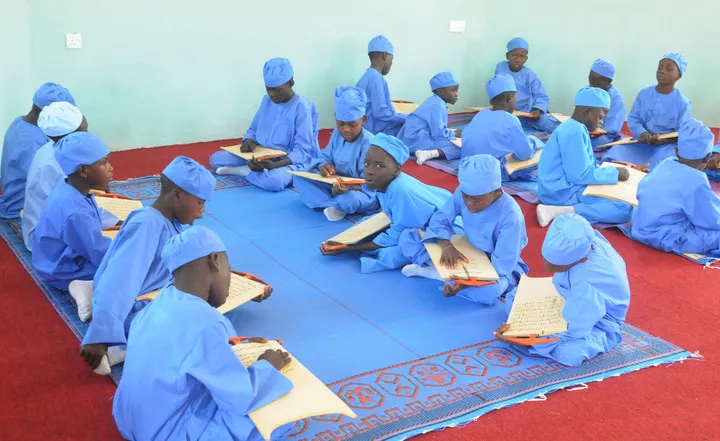During most of the fasting period, I happened to be in Kano City for one thing or another. One thing that didn’t go unnoticed in the city is the ubiquity of the almajirai – ordinarily a noble term, a tag, a name for those who migrate from their homes in search of Qur’anic knowledge. Not anymore. Almajirai are now the bedraggled, stranded and perpetually hungry urban kids of seven to 15 years old, swarming the streets of the cities up North and adding fuel to the humanitarian crisis in those large centres of population.
In Kano, they are everywhere on the streets, normally in groups begging from motorists, in front of shops and restaurants scrounging for leftovers or within those narrow alleys picking what they find. It would be the same picture in Kaduna, Zaria, Katsina, Sokoto, Maiduguri, or wherever in the far North.
Though the almajiri looks harmless and pitiable, by his vulnerable state he could be drawn into urban crimes. He could, far more seriously, be sucked into the army of insurgents especially those that make the pretence of espousing religious goals such as Boko Haram and the Maitatsine.
The almajirai constitute the majority of the over 10 million children out of school in the country.
- NIGERIA DAILY: The Actual ‘Role’ Of NNPP In Ganduje’s Suspension by APC
- Nasarawa outlawed ethnic vigilantes surrender uniforms to police
Within the confines of the North, the almajiri has been a persistent problem begging for a solution since the First Republic. It is a phenomenon that has been studied by scholars and education practitioners intently, has been the subject of discussion at seminar groups and the like, with mileage of solutions in books, policy papers in various offices and the whole lot. When all efforts seemed to have failed, the Northern governors at a time even took the precipitate decision to ban almajiranci as if such a deeply ingrained cultural practice could be wished away with a banning order. As expected, the banning order had no effect whatsoever.
The Almajiranci bill that was signed into law in the waning hours of the Buhari Presidency took the issue of almajiranci to the next level, ultimately establishing a commission to give a wholesome direction and unify efforts to tackle the almajiranci issue.
Besides other lofty ideals, the objectives of the commission are ‘to formulate policy and issue guidelines in all matters relating to almajiri education and out-of-school children in Nigeria as well as provide funds for research and personnel development for the improvement of almajiri education in the country, the development of programmes on almajiri education, construction of classrooms and other facilities relating to almajiri education and out of school children’.
Education at that basic level is a state and local government matter, but it is proper for the federal government to take leadership to unify the efforts of the states and more importantly to provide the needed funds to execute needed projects. For the first time, the federal government has taken firm responsibility for dealing with the almajiri phenomenon including the other out-of-school kids that are compounding the problems. The Tinubu administration has gone further by making exciting appointments to the top of the commission, forming the team that would have the responsibility of realising the lofty aims enunciated in the Almajiri Act.
Lawal Jafaru Isa, who was earlier mistakenly announced as the executive secretary, is the chairman of the board of directors of the commission. A retired Brigadier-General, Jafaru Isa, was a former military governor of Kaduna State. He is reputed to be a hands-on administrator who can be expected to get things done. As an early associate of President Buhari’s foray into politics, many had expected him to have played a more prominent role in the many years of the previous administration.
Appointing Dr Mohammed Sani Idris as the executive secretary/chief executive of the commission is bringing a square peg to fill a square hole. Dr Sani Idris has for a very long time been out there in the streets as a loud advocate for almajiri education. For most of his working life, he has been directly associated with one form of almajiri education or the other. He was for many years the Director of El-Kanemi College of Islamic Theology, arguably the best Islamic model school in Borno State. The college, which sits on resplendent grounds in Maiduguri on the road leading to the airport junction, has been accommodating students studying both the English and Arabic syllabus.
The performance of the college in JAMB, WASC and NECO has always been one of the most impressive in the state. From there he was called upon to serve as Commissioner for Basic Education in Yobe, one of the most educationally challenged states in Nigeria. While there he was also coordinating the building of model Islamic schools across the country on behalf of one foundation or the other. I have met him a number of times and I always come away with the passion he puts into his advocacy for almajiri education.
One only hopes that both Jafaru Isa and Dr Mohammed Sani Idris will see their appointments to the board of almajiri and out-of-school children as a historic opportunity to rally the states to reform the almajiri system of education and give renewed hope to almajiri.

 Join Daily Trust WhatsApp Community For Quick Access To News and Happenings Around You.
Join Daily Trust WhatsApp Community For Quick Access To News and Happenings Around You.


